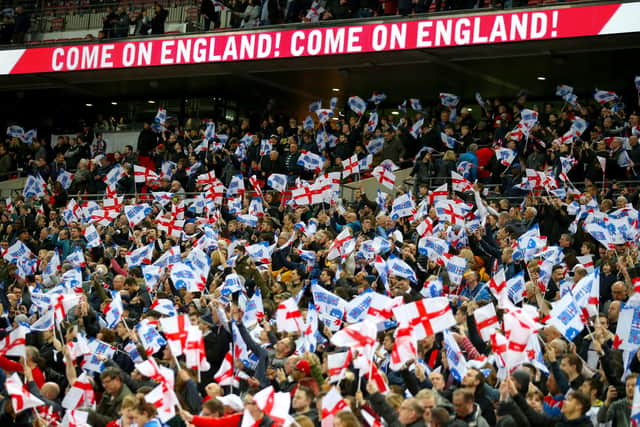Euro 2020 England-Denmark: Why Scots shouldn't worry about supporting 'anyone but England' – Martyn McLaughlin
What if they do it? What if they finally exorcise the ghosts of 1966 to set a new benchmark? What if they break free from that fuzzy prison of nostalgia to conquer the rest of Europe? What if the prevailing sporting narrative of the next half-century is – whisper it – 2021 and all that?
If England’s men’s national football team can book its day with destiny this weekend, Scotland may face its own reckoning. Or so the narrative goes.
Advertisement
Hide AdAdvertisement
Hide AdFor decades, argument has raged over our allegiances whenever our oldest rivals threaten the latter stages of a major international football tournament. In reality, it is a confected controversy which presents Scots with a binary decision: either support their nearest neighbours at all costs, or cheer on their opponents with a barely disguised relish.
One option is as petty and reductive as the next, offering no room for nuance, let alone ambivalence. Yet still the conundrum is posed, with familiar recriminations not far behind.
Scots who backed Ukraine during their quarter-final loss against England were vilified in sections of the UK press as “bitter”, while some of those siding with Gareth Southgate’s men were cast as traitors by the jury of social media.
Thus has it always been, say some observers, and thus shall it ever be. But this need not be the case. Thanks to the demise of the annual Home Championships, the dynamics between the auld enemies have shifted, and they will continue to do so. It is only the insistent politicisation of football culture by those who know nothing of the game’s appeal which preserves a deceit disguised as a quandary.
Mercifully, the biannual bout of hand-wringing over how Scotland should react to a series of English victories has been less pronounced this time around. A great deal of credit for that should go to Steve Clarke and his players, who finally joined the party of an international tournament after a generation in the wilderness.


In the end, it was not to be, but Scotland’s brief foray at the Euros delivered more pride than frustration, and the point earned at Wembley was a salve on the open wound that has festered ever since Paul Gascoigne’s moment of wizardry a quarter of a century ago.
There is also a natural respect and admiration for Mr Southgate and his players. He is a manager whose emotional intelligence is his greatest virtue, and there can be few greater examples of the power of resilience than the redemption narrative which has taken him from national scapegoat to the ringleader of an assured new generation unburdened by what has gone before.
These are England players hewn from stronger stuff than the tubthumping, bulldog triumphalists of old, with the likes of Marcus Rashford and Tyrone Mings winning plaudits off the field for their impassioned engagement with wider societal issues. This is a team with strengths. More importantly, it is a team with values.
Advertisement
Hide AdAdvertisement
Hide Ad

So when they line up in a packed Wembley tonight for their semi-final against Denmark, should we in Scotland be willing them to victory? Well, in order to answer that question satisfactorily, it is worth reflecting on why it is still being asked.
The response seems obvious at first. Both nations belong to the same island, with a shared, storied history. The very fact they are neighbours is an invitation for what Freud described as “the narcissism of small differences” to manifest itself in rivalry. But as with so much else, that friction is increasingly framed through the prism of the constitution.
The problem with this is that it conflates sporting rivalries with political partisanship, leading to a multitude of lazy assumptions and crude conclusions. It ignores the fact that some footsoldiers of the Tartan Army are dyed-in-the-wool Tories, or that a minority of paid-up SNP members are English nationals who support Scottish independence. Other combinations are available on request.
The stooshie has also given rise to the theory that a groundswell of Scottish support for England would be a powerful demonstration of the nation’s new-found confidence and maturity. It is unclear where this theory originated from, but the natural suspicion has to be a dreary dinner party attended by a cross-section of civic Scotland’s chattering classes.
The foundational appeal of this wonderful, exasperating game lies in its unashamed tribalism. Football, and the act of following it, is about partiality. Some measure glory by hauls of glittering trophies, but for the vast majority of fans who, by dint of birth or circumstance, follow clubs and nations destined to mediocrity, success is defined in other ways. Chief among them is getting one over your neighbours.
Having a rival, particularly one with superior resources, can strengthen the resolve of a team and its followers. It is a source of constant threat, yet reassurance, too. Just as this is true of Cumnock vs Auchinleck Talbot, so it is of Scotland vs England.
There is an argument that such rivalries can spill over with altogether more ominous consequences for our wider political discourse, and while this should not be dismissed, the so-called ‘Anyone But England’ brigade is about as provocative as a pantomime villain.
Anyone who has travelled with Scotland abroad for a game will rightly regard such preemptive judgements as misguided and unfair. Those with shorter memories need only recall the morning after the England game, when Scots were out in force cleaning up litter in Leicester Square.
Advertisement
Hide AdAdvertisement
Hide AdSo when it comes to the crunch, who will you be backing? This, once again, is a question best tackled with help from Socrates – the Greek philosopher, that is, not the Brazilian midfielder – by answering a question with a question.
If by some rupture in the space-time continuum, the Scotland team found itself two games away from immortality, would the issue of where English loyalties lie be a subject of public obsession?
A message from the editor:
Thank you for reading this article. We're more reliant on your support than ever as the shift in consumer habits brought about by coronavirus impacts our advertisers. If you haven't already, please consider supporting our trusted, fact-checked journalism by taking out a digital subscription.
Comments
Want to join the conversation? Please or to comment on this article.
